Unit 9 Can you come to my party? Section A (1a~1c) 课件(共30张PPT)
文档属性
| 名称 | Unit 9 Can you come to my party? Section A (1a~1c) 课件(共30张PPT) | 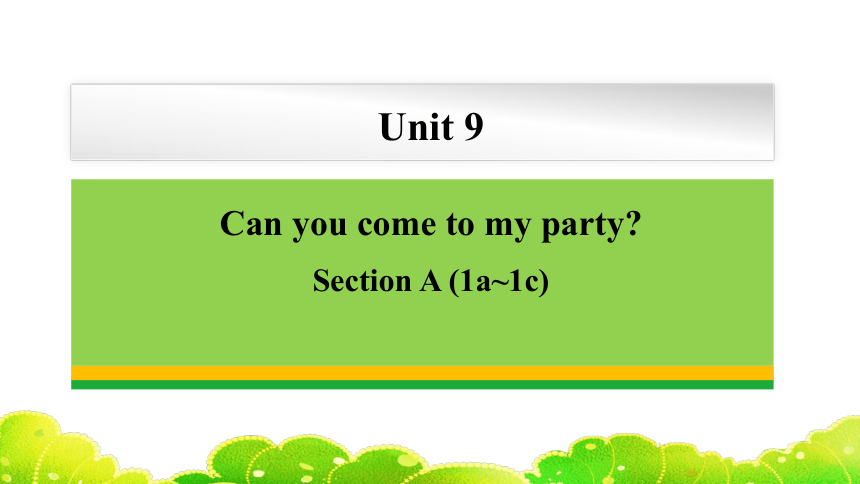 | |
| 格式 | pptx | ||
| 文件大小 | 96.0MB | ||
| 资源类型 | 教案 | ||
| 版本资源 | 人教新目标(Go for it)版 | ||
| 科目 | 英语 | ||
| 更新时间 | 2024-01-15 22:08:29 | ||
图片预览

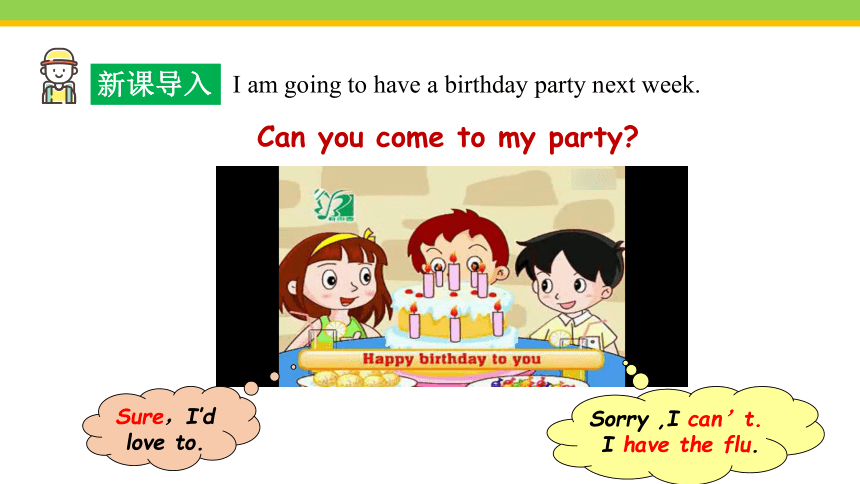
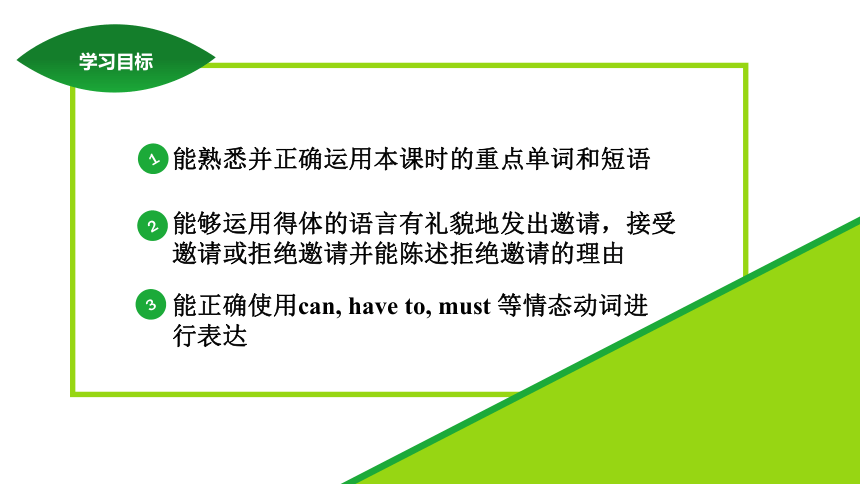
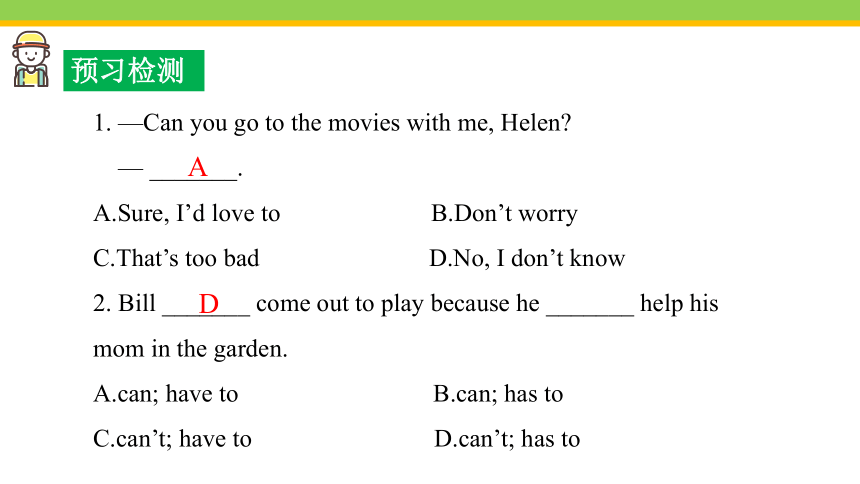
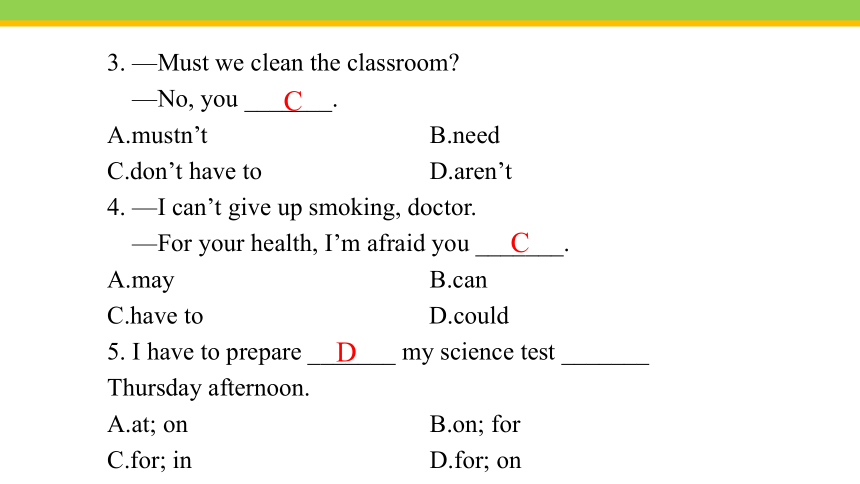
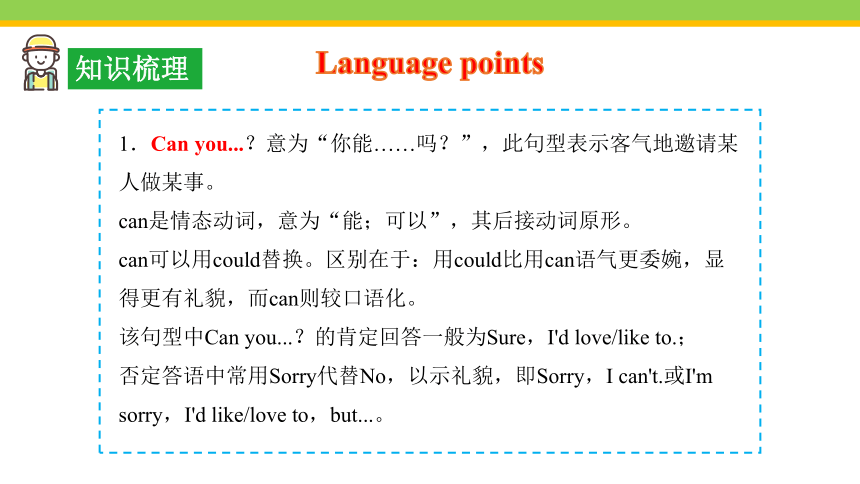
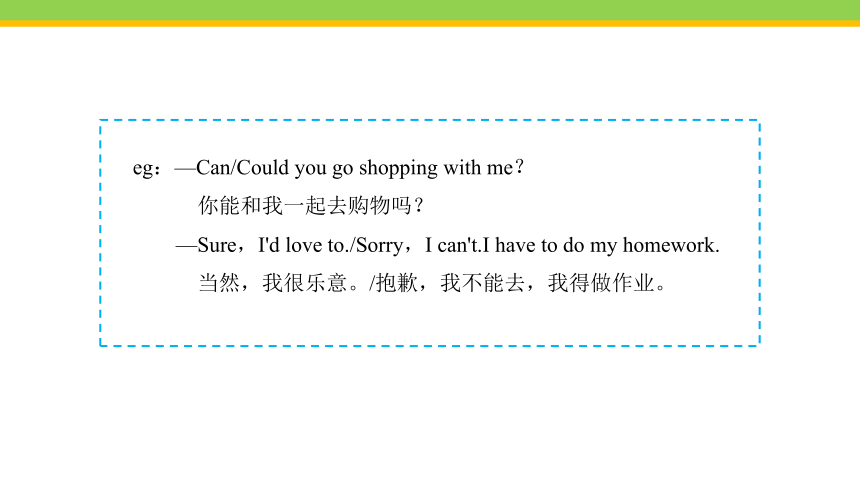
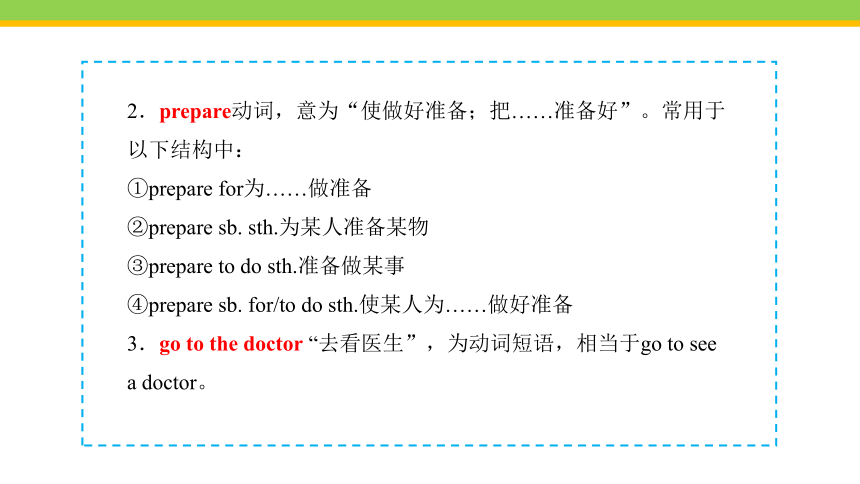
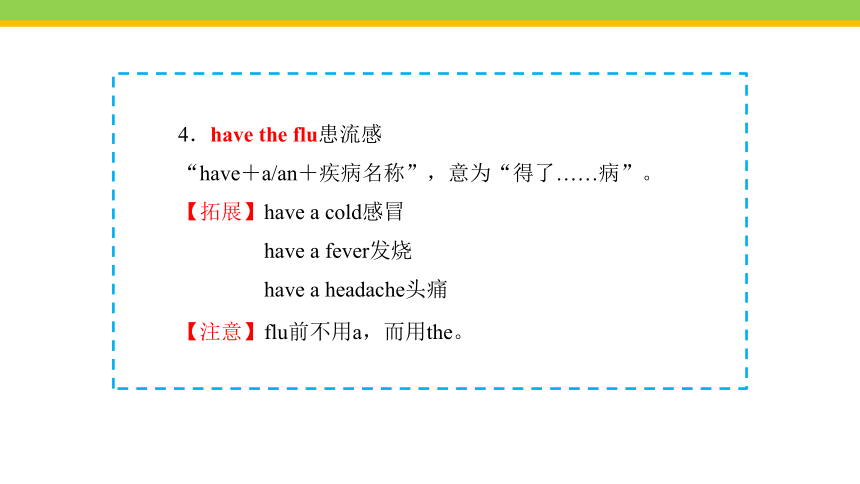
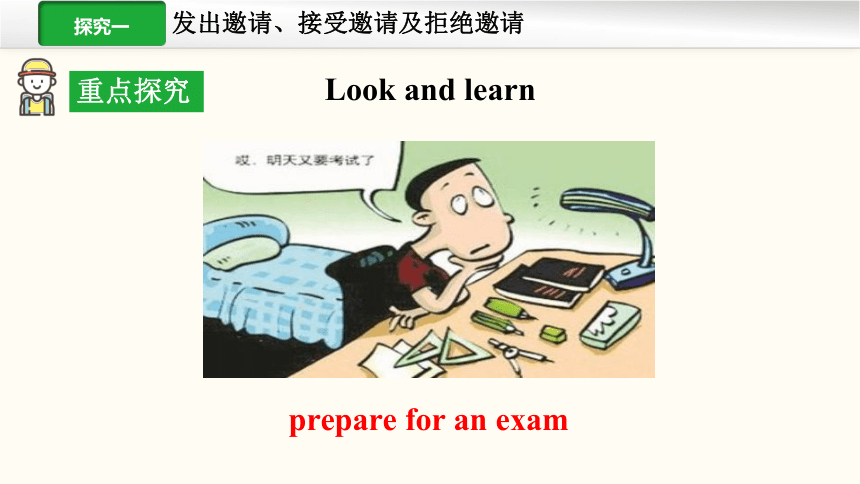


文档简介
(共30张PPT)
Unit 9
Can you come to my party
Section A (1a~1c)
新课导入
Can you come to my party
I am going to have a birthday party next week.
Sure,I’d love to.
Sorry ,I can’t.
I have the flu.
2
能够运用得体的语言有礼貌地发出邀请,接受邀请或拒绝邀请并能陈述拒绝邀请的理由
1
能熟悉并正确运用本课时的重点单词和短语
3
能正确使用can, have to, must 等情态动词进行表达
预习检测
1. —Can you go to the movies with me, Helen
— _______.
A.Sure, I’d love to B.Don’t worry
C.That’s too bad D.No, I don’t know
2. Bill _______ come out to play because he _______ help his mom in the garden.
A.can; have to B.can; has to
C.can’t; have to D.can’t; has to
A
D
3. —Must we clean the classroom
—No, you _______.
A.mustn’t B.need
C.don’t have to D.aren’t
4. —I can’t give up smoking, doctor.
—For your health, I’m afraid you _______.
A.may B.can
C.have to D.could
5. I have to prepare _______ my science test _______ Thursday afternoon.
A.at; on B.on; for
C.for; in D.for; on
C
C
D
知识梳理
Language points
1.Can you...?意为“你能……吗?”,此句型表示客气地邀请某人做某事。
can是情态动词,意为“能;可以”,其后接动词原形。
can可以用could替换。区别在于:用could比用can语气更委婉,显得更有礼貌,而can则较口语化。
该句型中Can you...?的肯定回答一般为Sure,I'd love/like to.;
否定答语中常用Sorry代替No,以示礼貌,即Sorry,I can't.或I'm sorry,I'd like/love to,but...。
eg:—Can/Could you go shopping with me?
你能和我一起去购物吗?
—Sure,I'd love to./Sorry,I can't.I have to do my homework.
当然,我很乐意。/抱歉,我不能去,我得做作业。
2.prepare动词,意为“使做好准备;把……准备好”。常用于以下结构中:
①prepare for为……做准备
②prepare sb. sth.为某人准备某物
③prepare to do sth.准备做某事
④prepare sb. for/to do sth.使某人为……做好准备
3.go to the doctor “去看医生”,为动词短语,相当于go to see a doctor。
4.have the flu患流感
“have+a/an+疾病名称”,意为“得了……病”。
【拓展】have a cold感冒
have a fever发烧
have a headache头痛
【注意】flu前不用a,而用the。
重点探究
发出邀请、接受邀请及拒绝邀请
prepare for an exam
Look and learn
have the flu
have a cold
go to the doctor
go to a doctor
go to see a doctor
help my parents
meet my friend
1a. Match the phrases with the pictures [a-e].
1. prepare for an exam ______
2. help my parents ______
3. go to the doctor ______
4. meet my friend ______
5. have the flu ______
a
e
d
b
c
Listening
1b. Listen and write the names (Tim, Kay, Anna
and Wilson) next to the correct students in the picture.
Anna
Tim
Kay
Wilson
Group work
1c. You are the students in the picture.
Student A, invite three students to your party.
Student B, C and D, give answers.
Can you come to my party on Saturday afternoon
Sure, I’d love to.
Sorry, I can’t. I
have to/must...
Survey and report
Names Answers
Work in groups and report it.
活动小结
互动检测见DCF课件
通过以上的活动可知,发出邀请的句型为1.________________;如果接受邀请,可以回答2.________________;如果拒绝邀请,可以回答3.__________________。
Can you…
Sure, I’d love to
Sorry, I can’t+理由
情态动词can、must、have to的用法
Group work
小组内讨论can、must、have to等情态动词的意义及用法
A: Can you come to my party on Saturday afternoon
B: Sure, I’d love to.
C: Sorry, I can’t. I have to prepare for an exam.
D: I’m sorry, too. I must go to the doctor.
情态动词can
情态动词can,“能;会”,表示说话人的语气或情态,没有人称和数的变化,在句子中不能常独作谓语,其后须跟实义动词原形。
—Can you speak English?你会讲英语吗?
—Yes,I can.是的,我会。
—Can you come to my birthday party tomorrow?
—Sorry,I am afraid not.I'm going to visit my grandpa.
情态动词must
must,“必须,不得不”,强调说话者主观上认为必须做某事,含有“主观判断”的意味。
eg:I must get up at 6 o'clock every morning.
我每天早上必须六点钟起床。
have to的用法
“have to”意为“不得不,必须”,强调客观上需要,即外界条件的需要不得不做某事,含有“形势逼迫”的意味;有单、复数及时态的变化,其第三人称单数为has to,过去式为had to。
eg: His mother is ill.He has to stay at home and look after her.
他妈妈病了。他不得不待在家里照顾她。
have to 与must的区别:
①have to意为“不得不;必须”,它强调一种客观情况。must意为“必须”,着重于说话人主观上认为有义务、有必要。
eg: We have to go home now because it's dark.
我们现在必须回家因为天黑了。
You must do it yourself.
你必须自己做。
②have to 有单复数及时态的变化,must无人称、时态、数的变化。
Complete the following sentences
1. _______ you go to the zoo with me
2. I ________ do it myself .
3. He _______ stay at home, because his mother is ill.
4. I _____ play basketball with you tomorrow.
5. He ______ study for the test because he wants to get a good grade.
6. I_________ go to my guitar lesson at 19:00 in the evening.
Can
must
has to
have to
can
must
活动小结
互动检测见DCF课件
通过以上的活动可知,can在本课时中表示1.______、_____;2. ________强调客观上需要,即外界条件的需要不得不做某事,含有“形势逼迫”的意味;3.______强调说话者主观上认为必须做某事,含有“主观判断”的意味。
must
请求
邀请
have to
一、根据句意及汉语提示写单词。
当堂检测
1.Mrs. Li (准备) for the party all day and she felt very tired.
2.I don't feel well today.I'm afraid I have the (流感).
3.Frank was afraid of telling his parents the result of the (考试).
4.The last day of a week is (星期六).
5.My parents are (医生) and they work in the same hospital.
prepared
flu
exam
Saturday
doctors
二、根据句意用所给词的适当形式填空。
1. Yesterday afternoon,Mr. Wang (meet) his old friend in the street.
2. I can't (go) to your birthday party.
3. How about (make) a cake for her
4. I'd love (have) a cup of Chinese tea.
5. We must (stop) when the traffic lights are red.
met
go
making
to have
stop
课堂总结
Unit 9
Section A (1a~1c)
情态动词can, have to, must :
______在本课时中表示发出请求、邀请;_________强调客观上需要;_______强调说话者主观上认为必须做某事,含有“主观判断”的意味。
发出邀请的句型:
__________________________________
接受邀请:
_________________
拒绝邀请:
_________________
重点单词和短语:
________,________,_____,____________,
___________________.
flu
prepare for
exam
prepare
go to the/a doctor
Can you come to
my party
Sure, I’d love to.
Sorry, I can’t+理由
can
have to
must
Unit 9
Can you come to my party
Section A (1a~1c)
新课导入
Can you come to my party
I am going to have a birthday party next week.
Sure,I’d love to.
Sorry ,I can’t.
I have the flu.
2
能够运用得体的语言有礼貌地发出邀请,接受邀请或拒绝邀请并能陈述拒绝邀请的理由
1
能熟悉并正确运用本课时的重点单词和短语
3
能正确使用can, have to, must 等情态动词进行表达
预习检测
1. —Can you go to the movies with me, Helen
— _______.
A.Sure, I’d love to B.Don’t worry
C.That’s too bad D.No, I don’t know
2. Bill _______ come out to play because he _______ help his mom in the garden.
A.can; have to B.can; has to
C.can’t; have to D.can’t; has to
A
D
3. —Must we clean the classroom
—No, you _______.
A.mustn’t B.need
C.don’t have to D.aren’t
4. —I can’t give up smoking, doctor.
—For your health, I’m afraid you _______.
A.may B.can
C.have to D.could
5. I have to prepare _______ my science test _______ Thursday afternoon.
A.at; on B.on; for
C.for; in D.for; on
C
C
D
知识梳理
Language points
1.Can you...?意为“你能……吗?”,此句型表示客气地邀请某人做某事。
can是情态动词,意为“能;可以”,其后接动词原形。
can可以用could替换。区别在于:用could比用can语气更委婉,显得更有礼貌,而can则较口语化。
该句型中Can you...?的肯定回答一般为Sure,I'd love/like to.;
否定答语中常用Sorry代替No,以示礼貌,即Sorry,I can't.或I'm sorry,I'd like/love to,but...。
eg:—Can/Could you go shopping with me?
你能和我一起去购物吗?
—Sure,I'd love to./Sorry,I can't.I have to do my homework.
当然,我很乐意。/抱歉,我不能去,我得做作业。
2.prepare动词,意为“使做好准备;把……准备好”。常用于以下结构中:
①prepare for为……做准备
②prepare sb. sth.为某人准备某物
③prepare to do sth.准备做某事
④prepare sb. for/to do sth.使某人为……做好准备
3.go to the doctor “去看医生”,为动词短语,相当于go to see a doctor。
4.have the flu患流感
“have+a/an+疾病名称”,意为“得了……病”。
【拓展】have a cold感冒
have a fever发烧
have a headache头痛
【注意】flu前不用a,而用the。
重点探究
发出邀请、接受邀请及拒绝邀请
prepare for an exam
Look and learn
have the flu
have a cold
go to the doctor
go to a doctor
go to see a doctor
help my parents
meet my friend
1a. Match the phrases with the pictures [a-e].
1. prepare for an exam ______
2. help my parents ______
3. go to the doctor ______
4. meet my friend ______
5. have the flu ______
a
e
d
b
c
Listening
1b. Listen and write the names (Tim, Kay, Anna
and Wilson) next to the correct students in the picture.
Anna
Tim
Kay
Wilson
Group work
1c. You are the students in the picture.
Student A, invite three students to your party.
Student B, C and D, give answers.
Can you come to my party on Saturday afternoon
Sure, I’d love to.
Sorry, I can’t. I
have to/must...
Survey and report
Names Answers
Work in groups and report it.
活动小结
互动检测见DCF课件
通过以上的活动可知,发出邀请的句型为1.________________;如果接受邀请,可以回答2.________________;如果拒绝邀请,可以回答3.__________________。
Can you…
Sure, I’d love to
Sorry, I can’t+理由
情态动词can、must、have to的用法
Group work
小组内讨论can、must、have to等情态动词的意义及用法
A: Can you come to my party on Saturday afternoon
B: Sure, I’d love to.
C: Sorry, I can’t. I have to prepare for an exam.
D: I’m sorry, too. I must go to the doctor.
情态动词can
情态动词can,“能;会”,表示说话人的语气或情态,没有人称和数的变化,在句子中不能常独作谓语,其后须跟实义动词原形。
—Can you speak English?你会讲英语吗?
—Yes,I can.是的,我会。
—Can you come to my birthday party tomorrow?
—Sorry,I am afraid not.I'm going to visit my grandpa.
情态动词must
must,“必须,不得不”,强调说话者主观上认为必须做某事,含有“主观判断”的意味。
eg:I must get up at 6 o'clock every morning.
我每天早上必须六点钟起床。
have to的用法
“have to”意为“不得不,必须”,强调客观上需要,即外界条件的需要不得不做某事,含有“形势逼迫”的意味;有单、复数及时态的变化,其第三人称单数为has to,过去式为had to。
eg: His mother is ill.He has to stay at home and look after her.
他妈妈病了。他不得不待在家里照顾她。
have to 与must的区别:
①have to意为“不得不;必须”,它强调一种客观情况。must意为“必须”,着重于说话人主观上认为有义务、有必要。
eg: We have to go home now because it's dark.
我们现在必须回家因为天黑了。
You must do it yourself.
你必须自己做。
②have to 有单复数及时态的变化,must无人称、时态、数的变化。
Complete the following sentences
1. _______ you go to the zoo with me
2. I ________ do it myself .
3. He _______ stay at home, because his mother is ill.
4. I _____ play basketball with you tomorrow.
5. He ______ study for the test because he wants to get a good grade.
6. I_________ go to my guitar lesson at 19:00 in the evening.
Can
must
has to
have to
can
must
活动小结
互动检测见DCF课件
通过以上的活动可知,can在本课时中表示1.______、_____;2. ________强调客观上需要,即外界条件的需要不得不做某事,含有“形势逼迫”的意味;3.______强调说话者主观上认为必须做某事,含有“主观判断”的意味。
must
请求
邀请
have to
一、根据句意及汉语提示写单词。
当堂检测
1.Mrs. Li (准备) for the party all day and she felt very tired.
2.I don't feel well today.I'm afraid I have the (流感).
3.Frank was afraid of telling his parents the result of the (考试).
4.The last day of a week is (星期六).
5.My parents are (医生) and they work in the same hospital.
prepared
flu
exam
Saturday
doctors
二、根据句意用所给词的适当形式填空。
1. Yesterday afternoon,Mr. Wang (meet) his old friend in the street.
2. I can't (go) to your birthday party.
3. How about (make) a cake for her
4. I'd love (have) a cup of Chinese tea.
5. We must (stop) when the traffic lights are red.
met
go
making
to have
stop
课堂总结
Unit 9
Section A (1a~1c)
情态动词can, have to, must :
______在本课时中表示发出请求、邀请;_________强调客观上需要;_______强调说话者主观上认为必须做某事,含有“主观判断”的意味。
发出邀请的句型:
__________________________________
接受邀请:
_________________
拒绝邀请:
_________________
重点单词和短语:
________,________,_____,____________,
___________________.
flu
prepare for
exam
prepare
go to the/a doctor
Can you come to
my party
Sure, I’d love to.
Sorry, I can’t+理由
can
have to
must
同课章节目录
- Unit 1 Where did you go on vacation?
- Section A
- Section B
- Unit 2 How often do you exercise?
- Section A
- Section B
- Unit 3 I'm more outgoing than my sister.
- Section A
- Section B
- Unit 4 What's the best movie theater?
- Section A
- Section B
- Unit 5 Do you want to watch a game show?
- Section A
- Section B
- Unit 6 I'm going to study computer science.
- Section A
- Section B
- Unit 7 Will people have robots?
- Section A
- Section B
- Unit 8 How do you make a banana milk shake?
- Section A
- Section B
- Unit 9 Can you come to my party?
- Section A
- Section B
- Unit 10 If you go to the party, you'll have a grea
- Section A
- Section B
